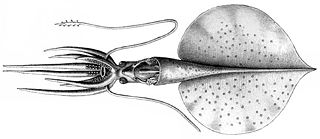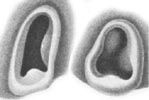
The Mastigoteuthidae, also known as whip-lash squid, are a family of small deep-sea squid. Approximately 20 known species in six genera are represented, with members found in both the mesopelagic and bathypelagic zone of most oceans. Originally described by Verill in 1881, it was later lowered by Chun (1920) to a subfamily (Mastigoteuthinae) of the Chiroteuthidae. However, Roper et al. (1969) raised it back to the family level, and this has not been changed since. The taxonomy of this family is extremely unstable, and there have been at times one genus, two genera and four subgenera(Salcedo-Vargas & Okutani, 1994), two genera and several 'groups', five genera and one species with an uncertain placement, or six genera.

Karl Patterson Schmidt was an American herpetologist.

Cranchiinae is a subfamily containing four genera of glass squids.

Magnapinna talismani is a species of bigfin squid known only from a single damaged specimen. It is characterised by small white nodules present on the ventral surface of its fins.
Echinoteuthis danae is a species of whip-lash squid. Known only from specimens of paralarvae, the species may be the juvenile form of Echinoteuthis atlantica.

Idioteuthis is a genus of whip-lash squid containing at least one species. Some teuthologists consider it synonymous with Mastigoteuthis, but genetics have confirmed the placement of this genus as distinct from all other genera in this family. The placement of Idioteuthis within the Mastigoteuthidae remains uncertain.
Mastigoteuthis is a genus of whip-lash squid containing at least seven valid species. Some teuthologists consider Idioteuthis synonymous with this taxon.
Echinoteuthis is a genus of whip-lash squid containing approximately three to five species. Some teuthologists consider Idioteuthis synonymous with this taxon.

Magnoteuthis is a genus of whip-lash squid containing at least three species. Some teuthologists consider Idioteuthis or Mastigoteuthis synonymous with this taxon, but it is genetically and morphologically distinct.

Mastigoteuthis agassizii is a species of whip-lash squid. It is the type species of the genus.

Echinoteuthis atlantica is a species of whip-lash squid from the family Mastigoteuthidae. It occurs in the eastern North and South Atlantic Ocean. This squid is red in colour and similar to Echinoteuthis famelica of the Pacific but differs in having a well developed protective membrane on the tentacular club which is absent on E. famelica. The presence on this membrane on Echinoteuthis glaukopis from the Indian Ocean suggests that this may be a synonym of E. atlantica, in which case glaukopis has priority.
Mastigoteuthis iselini is a species of whip-lash squid. Some authors treat it as a junior synonym of Mastigoteuthis atlantica. It was first identified by R. MacDonald and William J. Clench in 1934 and presented to the Boston Society of Natural History. The type locality was identified as the northwestern Atlantic Ocean.
Mastigoteuthis dentata is a species of whip-lash squid.

Mastigoteuthis flammea is a species of whip-lash squid.

Mastigoteuthis glaukopis is a species of whip-lash squid.

Mastigoteuthis grimaldii is a species of whip-lash squid.
Mastigoteuthis psychrophila is a species of whip-lash squid. It was first described by Kir Nazimovich Nesis in 1977, based on four individuals found in Antarctic waters. The largest was 143 mm long. The squid's tentacles are 15 mm in diameter, with 0.15 mm diameter club suckers. Integumental photophores are present upon the head, arms and fins. Although uncertain, it is believed to have more than two series of photophores on the arms, differing from other species in the M. agassizii group. However, this species, like the rest of the family, is badly in need of revision.

Magnoteuthis microlucens is a species of squid; the most common species of Mastigoteuthis around the main Hawaiian Islands.
Syngnathus schmidti, the Black Sea pelagic pipefish or Schmidt's pipefish, is a pipefish species that inhabits the Black Sea and Sea of Azov. A freshwater/brackishwater fish, it can grow up to 11 centimetres (4.3 in) long and usually lives at a depth of 1 to 10 metres, although it can live as deep as 100 metres (330 ft). The specific name honours the Danish zoologist Ernst Johannes Schmidt (1877–1933).
Mastigotragus is a genus of whip-lash squid containing a single species, Mastigotragus pyrodes. This species was originally placed within Mastigoteuthis, but has been subsequently separated from other species in that genus due to multiple morphological characters. This genus is characterized by a lack of antitragus in the funnel-locking cartilage, larger sucker rings on the tentacles, a particular photophore morphology, and relatively large eyelid photophore. This genus is Latin for 'whip-lash goat'.











